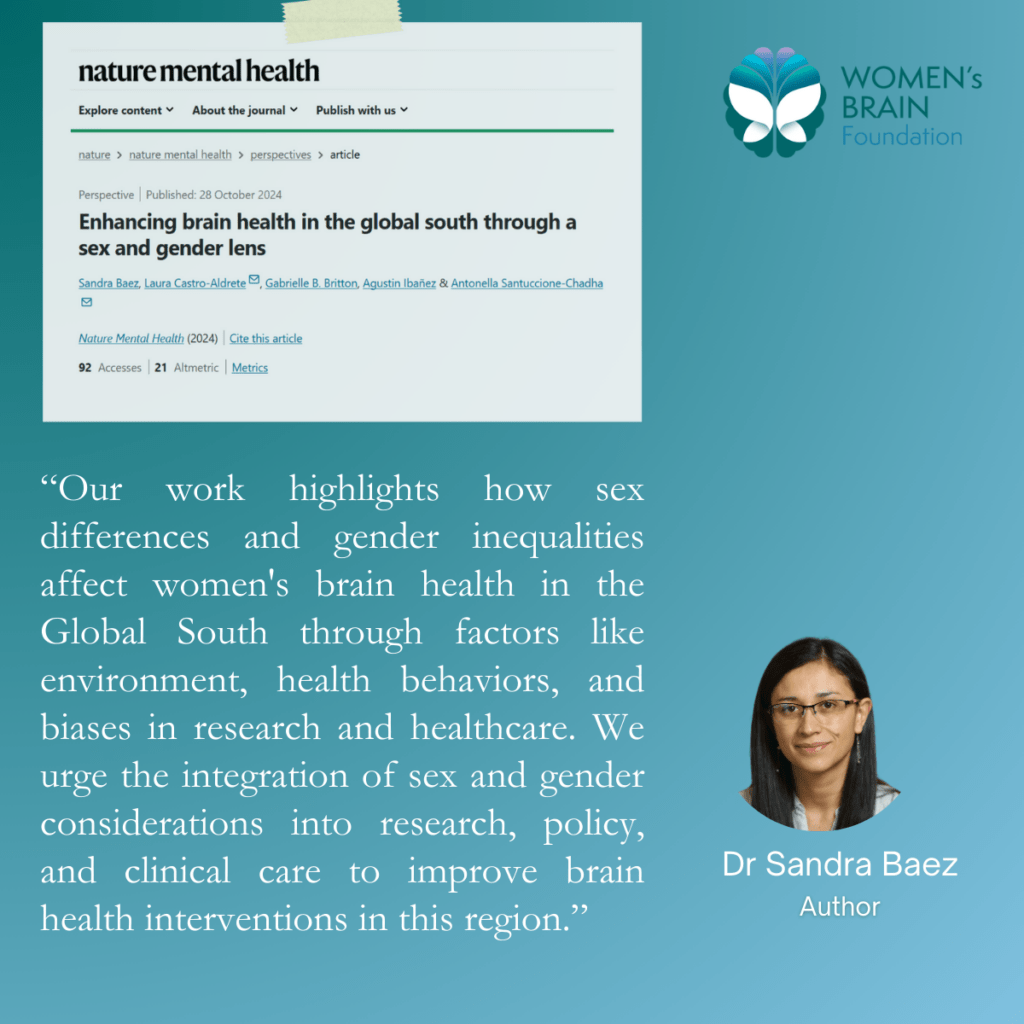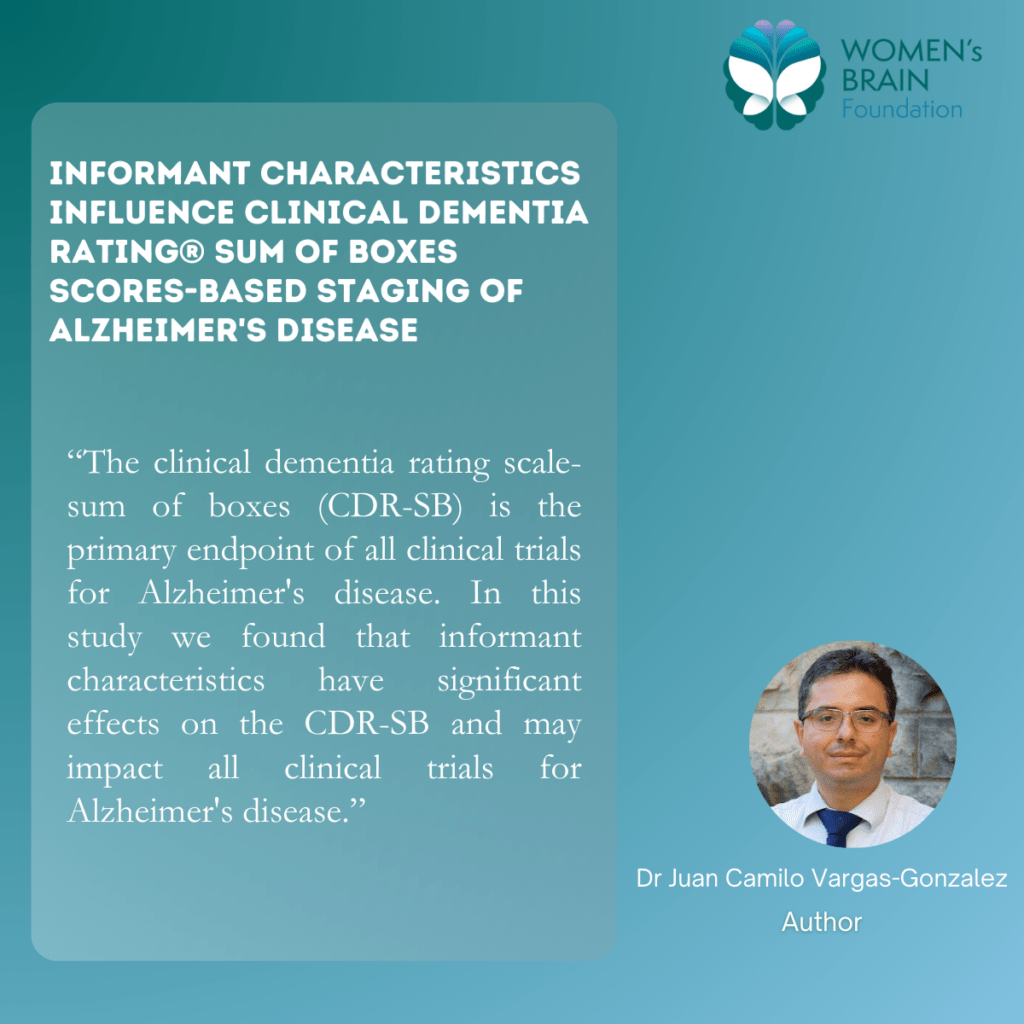New Studies Reveal Critical Sex and Gender Disparities in Alzheimer’s Disease and Brain Health
Press Release | Zurich, Switzerland | 28 October, 2024
Two groundbreaking studies have recently been published by the Women’s Brain Foundation (WBF), advancing our understanding of the role of sex and gender differences in brain health and Alzheimer’s disease. The first study, “Enhancing Brain Health in the Global South through a Sex and Gender Lens” sheds light on how gender disparities, especially in the Global South, contribute to a heightened risk of cognitive decline and dementia in women (Baez et al., 2024; https://www.nature.com/articles/s44220-024-00339-6). “This research highlights the urgent need to incorporate sex and gender considerations into health policies, research, and clinical interventions to mitigate the risks that disproportionately affect women” says Dr Antonella Santuccione Chadha, Founder and pro bono CEO of WBF. As Professor Gabrielle Britton, lead scientist of the Center for Neuroscience and the Panama Aging Research Initiative points out “In Latin America gender inequality deeply impacts society, significantly disadvantaging women in education, employment, and politics.”. By examining Alzheimer’s disease as a case study, the authors advocate for addressing the intricate interplay between biological sex differences and societal gender norms, which deeply affect women’s brain health.
The second study, “Informant characteristics influence Clinical Dementia Rating® Sum of Boxes scores-based staging of Alzheimer’s Disease“, was conducted in collaboration with international researchers from the University of Toronto and focuses on the impact of informant characteristics in the staging of Alzheimer’s disease. Their findings reveal that the relationship with the patients, the sex of the caregiver or informant, and frequency of contact between the informant and the patient can introduce biases into clinical evaluations, particularly in tools like the Clinical Dementia Rating Sum of Boxes (CDR-SB) (Vargas-Gonzalez et al., 2024; https://www.nature.com/articles/s43587-024-00732-x). When the informant is female the CDR-SB score will be higher as well as when the informant is a relative or has frequent contact with the patient. “These are alarming findings which can have tremendous impact on the outcomes of clinical trials for dementia and Alzheimer’s disease”, underscores Dr Santuccione Chadha. It is a call for the scientific community, adds Dr Barbato, leading scientists at WBF, to account for these biases in future research and clinical trials to ensure more accurate assessments of Alzheimer’s disease progression and treatment efficacy.
Key Highlights:
- Global Health Implications: Both studies emphasize the importance of addressing sex and gender disparities in brain health research, particularly in the Global South.
- Bias in Alzheimer’s Disease Evaluation: The second study’s revelation that informant characteristics can skew Alzheimer’s disease staging underscores the need for updated evaluation tools that mitigate biases and improve patient care (Vargas-Gonzalez et al., 2024).
- Call to Action for Sex and Gender-Inclusive Research: These studies are part of a growing body of research calling for inclusive, sex and gender-conscious research methodologies that move beyond binary models and reflect the diverse realities of patients.
About the Authors:
Both studies feature collaborations between leading institutions, including the Global Brain Health Institute (Ireland), the Women’s Brain Foundation (Switzerland), and the National Alzheimer’s Coordinating Center (Sweden) among others. The researchers are at the forefront of global efforts to integrate gender-sensitive approaches into scientific inquiry and healthcare practices.
About WBF
The Women’s Brain Foundation (WBF) is an international non-profit organization based in Switzerland. We are experts from various disciplines who are applying sex- and gender-based scientific evidence to develop precision medicine, from basic science to novel technologies. We conduct, coordinate, support, and advance research related to sex and gender differences to achieve this goal. We also act as an incubator and an accelerator of women’s health innovation. We focus our research and advocacy particularly, but not exclusively, on diseases of the brain.





